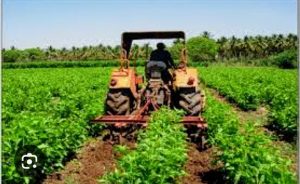

By Dada Ahmed.

(C) Google.
Food security remains one of the most pressing challenges in Nigeria today. With a population exceeding 220 million and projected to reach 400 million by 2050, the pressure on the nation’s food supply system is enormous. The traditional, labor-intensive methods of farming that dominate rural agriculture can no longer sustain the growing demand. To feed the nation adequately and reduce overreliance on food imports, mechanized farming offers a practical, sustainable, and transformative solution.
Mechanized farming refers to the use of agricultural machinery and technology to enhance efficiency in planting, cultivating, harvesting, and processing crops. This system reduces the need for manual labor, increases productivity per hectare, and allows for timely farming activities. In Nigeria, where 70 percent of the population depends on subsistence agriculture, agriculture experts believe that transitioning to mechanization could mark a turning point in the country’s agricultural sector.
The benefits of mechanized farming are manifold. Firstly, it significantly boosts productivity. In practical terms,a single tractor can do the work of dozens of farmers in a fraction of the time. With modern equipment like planters, harvesters, and irrigation systems, farmers can cultivate larger areas and achieve higher yields. This efficiency is essential in closing the gap between food production and consumption.
Mechanization also addresses one of the major bottlenecks in Nigerian agriculture—post-harvest losses. According to the Federal Ministry of Agriculture, the country loses up to 40% of its harvests due to poor handling and storage. With mechanized systems like combined harvesters and mobile storage solutions, these losses can be drastically reduced, ensuring that more food reaches markets and consumers.
Another compelling argument for mechanized farming is its potential to attract youths into agriculture. Nigeria’s youth unemployment rate hovers above 40 percent, while the average age of farmers is over 60. Mechanization modernizes farming, making it more appealing to younger generations who are tech-savvy and innovation-driven. With proper training and access to finance, youths can lead a new era of agripreneurship in Nigeria.
Moreover, mechanized farming enhances food affordability. Increased production lowers costs over time, which translates into cheaper food prices for consumers. In a country such as Nigeria where food inflation has been a persistent issue, especially due to insecurity and logistical challenges, improved efficiency through mechanization can stabilize prices and improve household nutrition.
The economic implications are also profound. A mechanized agricultural sector will not only meet domestic food demand but also position Nigeria as a major player in the global food market. Export of processed foods and raw agricultural materials can become a significant source of foreign exchange, reducing reliance on oil and creating millions of jobs across the value chain.
However, experience shows that for mechanized farming to thrive, there are challenges that must be addressed. Chief among them is access to capital. Modern farming equipment is expensive, and most smallholder farmers cannot afford it. Government intervention in the form of low-interest loans, subsidies, and cooperative societies is vital to bridge this gap.
Infrastructure is another hurdle. Poor rural roads, erratic electricity supply, and lack of storage facilities hinder the effectiveness of mechanized farming. Investment in rural infrastructure development is non-negotiable. Improved road networks facilitate the movement of machinery and produce, while rural electrification can power irrigation and processing units.
Land tenure systems must also be reformed. Fragmented and insecure land ownership discourages investment in mechanization. Policies that promote land consolidation and secure land rights will encourage farmers and agribusiness investors to adopt large-scale mechanized farming.
Education and training are equally important. Many farmers lack the technical knowledge to operate and maintain modern farming equipment. Agricultural extension services must be revitalized to provide continuous training, while tertiary institutions can introduce specialized courses in agricultural engineering and mechanization.
Private sector involvement is crucial. Tractor-hiring services, farm management companies, and agritech startups can play an active role in democratizing access to mechanization. Public-private partnerships can also facilitate the importation and local manufacturing of farm equipment, lowering costs and boosting availability.
Government policies must be consistent and supportive. The implementation of the National Agricultural Mechanization Policy (NAMP) and the Agricultural Promotion Policy must be prioritized. Policies that encourage mechanized farming should be free from bureaucracy and corruption, with transparent processes and measurable outcomes.
As climate change intensifies, mechanized farming also presents opportunities for climate-smart agriculture. Precision agriculture tools can optimize water and fertilizer usage, reduce waste, and minimize environmental impact. This is essential in promoting sustainable food systems in the face of changing weather patterns.
In the final analysis it is apt to say , without any equivocation,that mechanized farming is not a luxury but a necessity for Nigeria’s food security. The road to widespread mechanization may be challenging, but with the right mix of policies, investment, and commitment, Nigeria can transform its agricultural landscape. A mechanized farming promises not only food for all but also prosperity for millions of Nigerians who depend on agriculture for their livelihoods.
Ahmed publishes The Reporters.

